Cheetah Care
Cheetah Conservation Fund in Namibia provides a sanctuary for cheetahs that have been orphaned, injured or unable to survive in the wild. About 30 cheetahs receive care for the rest of their lives at the sanctuary with the opportunity to live in conditions as close as possible to the wild. The cost to care for each cheetah is $6,500 – $8,000 annually. It covers nutrition, veterinary care, animal enrichment, vaccinations, pest and parasite treatment, medical response and a cheetah safety environment.
In a small number of cases, a cheetah can be returned to thrive in the wild. Dr. Laurie Marker says that rewilding can be one of “the best investments in the future of cheetahs”.
With careful planning, implementation and ongoing monitoring, CCF’s efforts in rewilding have been a success. Since 1990, CCF has released 650 cheetahs back to the wild, and rehabilitated nearly 60 orphaned cheetahs. The CCF rewilding team released 8 cheetahs in 2021.
Sponsor a Cheetah
You can assist with the care of these animals by making a donation. When sponsoring a specific cheetah, at any dollar level, we will provide you with an annual update. Make sure to indicate, in the comment section of your donation, the name of the cheetah you would like to support. We are grateful for any amount, and you can make a one-time donation or a monthly donation to provide ongoing care.
Click on the images below to read about each individual cheetah available for sponsorship.
Aurora
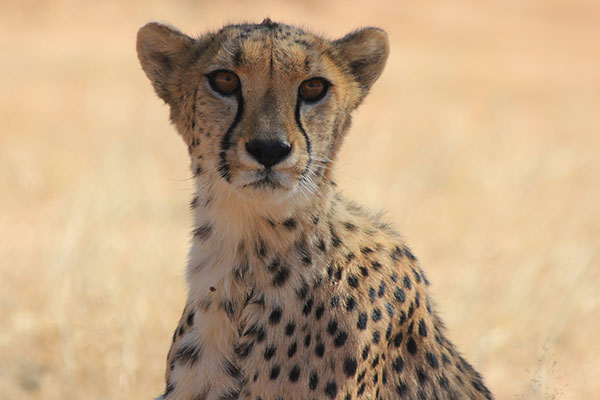
Aurora (female) was brought to the Cheetah Conservation Fund (CCF) as a cub in April 2013. A farmer found her without any sign of her mother and kept her for two weeks before calling CCF. When she arrived, her claws had been cut, she was malnourished, and extremely frightened. At CCF, she was introduced to another female cub, Rainbow, who arrived around the same time. The two have become companions and now share an enclosure.
Delilah
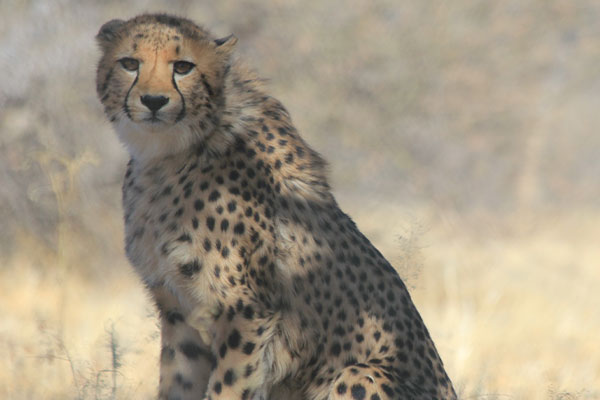
Delilah (female) is a cheetah and one of two cub siblings captured on a farm at approximately eight months old and brought to the Cheetah Conservation Fund (CCF) in December 2023. After a general veterinary check, including sample collection and measurements it was decided that she and her sibling, Mapenzi, will remain at CCF until they can be released when they reach two years of age.
Dominic
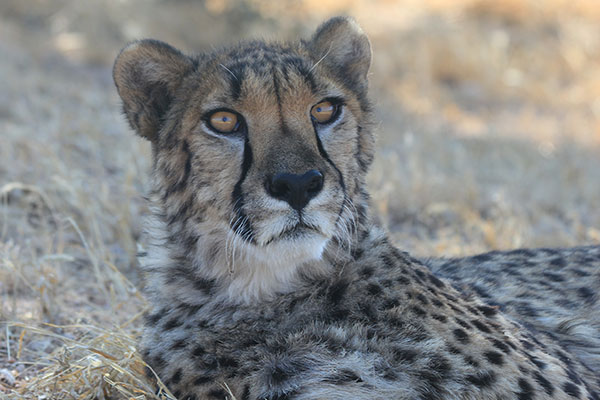
Dominic (male) was orphaned in the Khomas region of Namibia in May 2018. The Ministry of Environment Forestry and Tourism (MEFT) contacted the Cheetah Conservation Fund (CCF), and staff drove out to meet a farmer who reported that someone had dropped off a cub at her farm. The farmer had cared for the cub for about a week but became concerned when it started having health problems. Dominic was taken to a local vet for an initial assessment before being brought to CCF. At about 10-14 days old, his eyes had just opened, and he had no teeth. CCF staff prepared a nursery area for him and began feeding him a cat milk supplement every three hours. Dominic responded well to care and is now doing great.
Etango
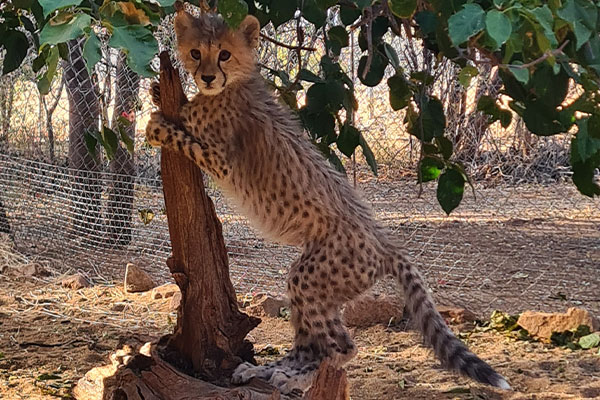
Etango (male) came to the Cheetah Conservation Fund (CCF) in April 2024 after being found near Otjiwarongo, Namibia. He was one of three seven-week-old cheetah cubs found without their mother by local workers. Despite efforts to save all the cubs, one of them died two days after arriving at CCF. Etango and his sibling Zephyr are recovering and healthy.
Good Boy

Somaliland – Good Boy is a juvenile male cheetah born in January 2025. He is recognized by the darkest diagonal tear lines in the group, running from the outer corners of his eyes. His facial features include a wide nose and widely spaced eyes, giving him a distinctive look that closely resembles his sister Marline, though his tail is darker than his siblings’, with over half shaded a deep grey. The white triangular patches above his eyes are narrow and elongated, adding to his striking appearance.
Good Boy has an easy-going nature but tends to keep his distance from people and does not seek out human interaction. He is generally calm within his cohort and enjoys rough play with Marline, though he can be hesitant in new situations or when introduced to unfamiliar cubs. He is more reserved during close contact and prefers space when under observation. He is also the first to lose interest in carcass feeding and prefers group-based enrichment activities, as he rarely engages in play independently.
Although not a dominant personality, Good Boy follows his siblings’ lead and integrates well into group routines. His temperament is observant and quiet, and his care is structured to respect his boundaries while supporting his social behavior.
Hadassah
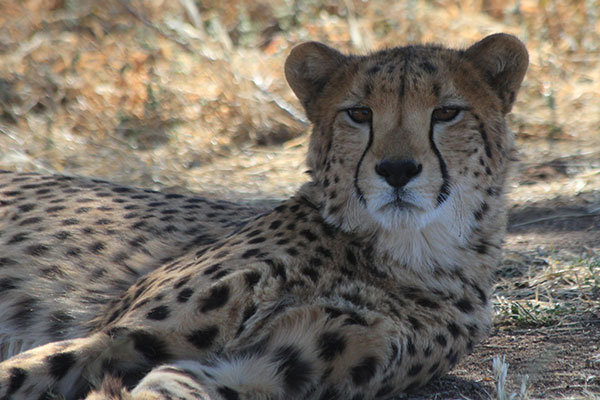
Hadassah (female) (formerly named Shy) is a cheetah and one of three orphaned cubs (Kora female and Teja male) born to a released female named Calypso. Calypso died from a snake bite shortly after giving birth, and the one-month-old cubs were rescued by CCF staff in March 2022. Hadassah was brought back to the main field center where she is being raised alongside her siblings and Kaveri.
Hamish
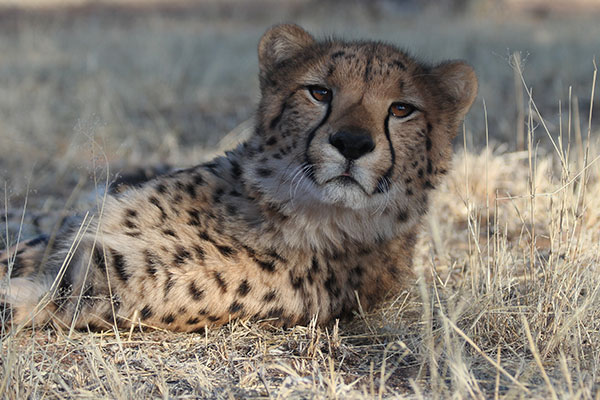
Hamish (male) and Kweli (female) were captured by a farmer in June 2023 after their mother died due to human-wildlife conflict. Sadly, a third cub died of starvation before reaching the Cheetah Conservation Fund (CCF). Hamish and Kweli are now living as permanent residents at CCF.
Jaya
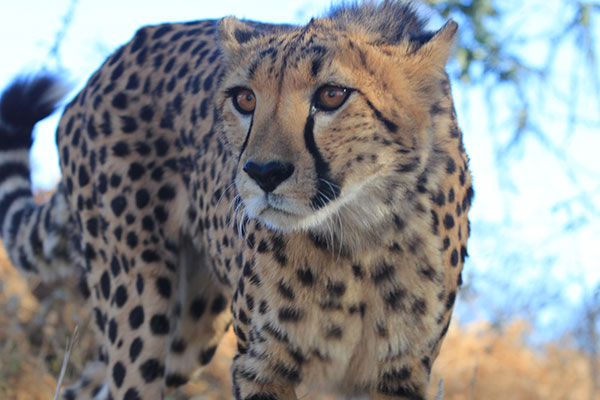
Jaya (female) was picked up by CCF staff in September 2019. A farmer had found her along the road next to her mother, who had been killed by a car. Jaya was still trying to nurse from her mother when found. The farmer took her home for a day to keep her safe before contacting CCF. Jaya has thrived at the Cheetah Conservation Fund (CCF), forming friendships with fellow orphaned cubs Rocket and Hans.
JEV

JEV (male) came to the Cheetah Conservation Fund (CCF) in November 2021 after losing his mom and siblings in a catch cage on a farm. Named after French racecar driver Jean-Éric Vergne, JEV loves food, which is used as motivation during his examinations and interactions. He is being socialized with other young cheetahs at CCF’s center in Namibia.
Katiti
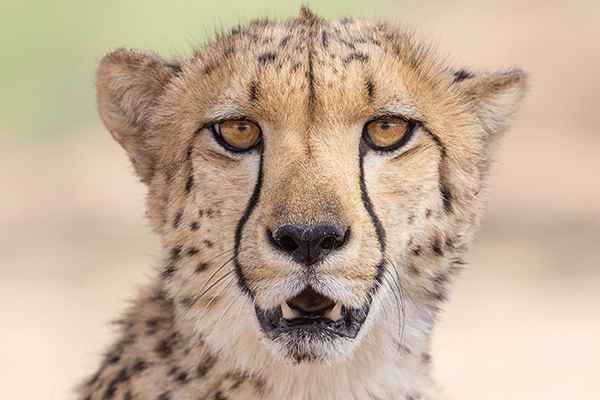
Katiti (male) came to the Cheetah Conservation Fund (CCF) in December 2017. Previously kept on a private farm with a very tame female cheetah, Bella, Katiti had been castrated a few months earlier. After not having permits granted to continue keeping them, the pair were handed over to CCF. Katiti had a poor diet of chicken necks but was switched to a red meat diet with vitamins and calcium supplements. He is quite shy and follows Bella around, gaining confidence with her and the keepers’ help. Katiti and Bella are inseparable, exploring and meeting other cheetahs together.
Kaveri
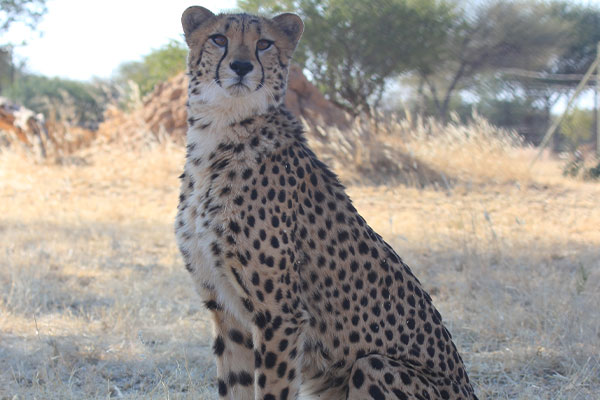
Kaveri (female) came to the Cheetah Conservation Fund (CCF) on August 9, 2022 from Farm Okatjomboa in Gobabis as an approximately two-month-old orphaned cub.
Khaleesi
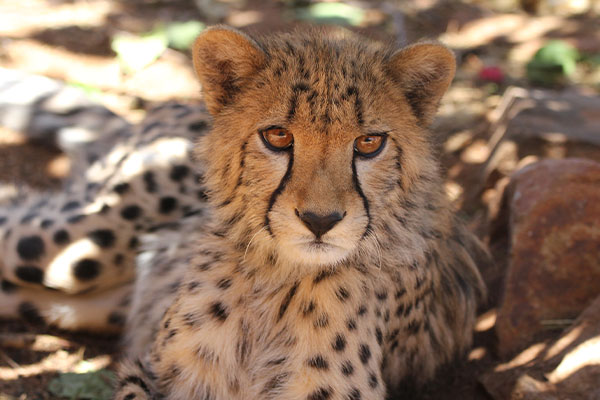
Khaleesi (female) came to CCF because of her mother, Daenerys, who was released in February 2019. In February 2021, CCF and Erindi Private Game Reserve staff noticed a problem with Daenerys’s tracking data and discovered she had a broken leg. While recovering at CCF, Daenerys gave birth to Khaleesi. Due to Daenerys’s injuries, she couldn’t properly care for her cub, so CCF staff stepped in. Khaleesi is now growing up as a resident cheetah at CCF’s headquarters in Namibia.
Kora
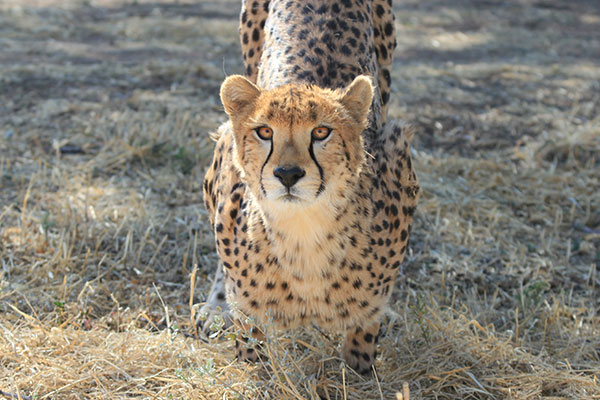
Kora (female) is a cheetah and one of three orphaned cubs (Hadassah, female – formerly named Shy, and Teja male) born to a released female named Calypso. Calypso died from a snake bite shortly after giving birth, and the one-month-old cubs were rescued by CCF staff in March 2022. Kora was brought back to the main field center where she is being raised alongside her siblings and Kaveri.
Koya
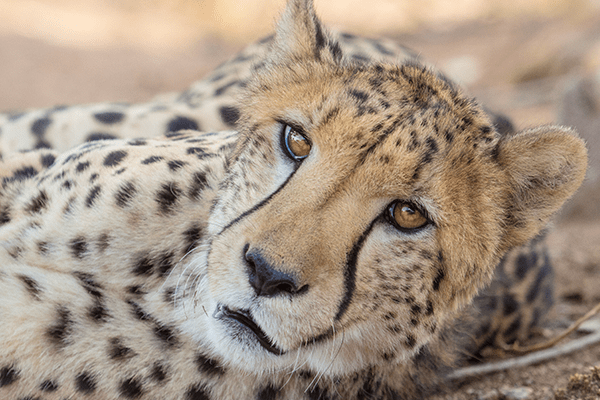
Koya (male) came to the Cheetah Conservation Fund (CCF) in July 2017 with his brother Niko. They were about six months old and had been kept in a small chicken coop for over two months after being captured and sold. The cubs were fed a poor diet and suffered from early-stage metabolic bone disease. Koya was very overweight due to lack of exercise but has since become very confident and enjoys stalking birds. He always greets his keepers for participatory veterinary training.
Lily
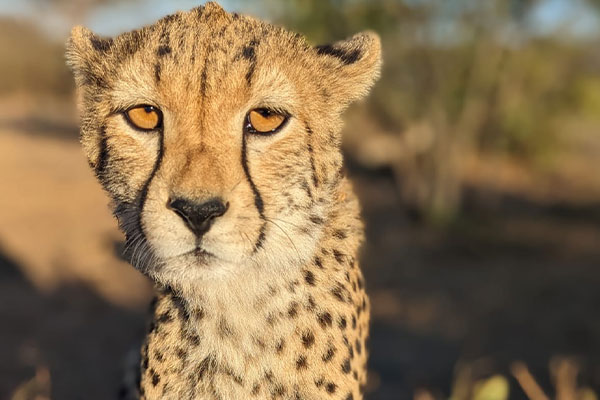
Somaliland – Lily is a female cheetah cub who was rescued in 2023 at just five months old after being trafficked through the illegal wildlife trade. When she arrived, she was severely malnourished, dehydrated, and suffering from multiple untreated wounds. Despite the trauma she endured, Lily has shown remarkable resilience. With dedicated care and a safe environment, she is steadily recovering and adjusting to life among other rescued cheetahs. Though she carries the physical and emotional scars of her early experiences, Lily’s progress is a testament to her strength and the power of intervention. Her journey continues as part of a long-term effort to rehabilitate and protect cheetahs affected by the illegal wildlife trade.
Kweli
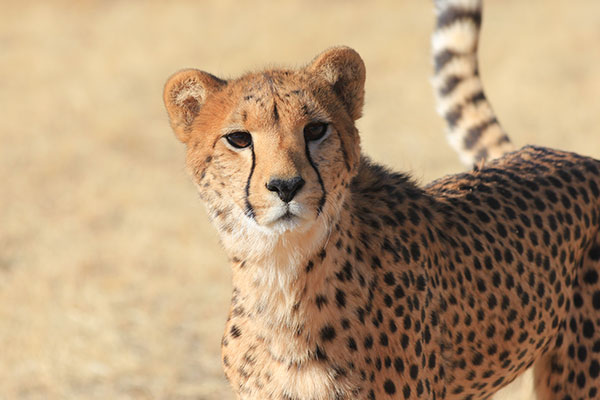
Kweli (female) and Hamish (male) were captured by a farmer in June 2023 after their mother died due to human-wildlife conflict. Sadly, a third cub died of starvation before reaching the Cheetah Conservation Fund (CCF). Kweli and Hamish are now living as permanent residents at CCF.
Marline
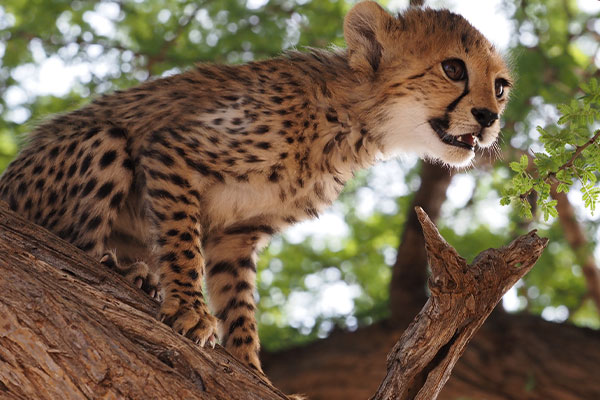
Somaliland – Marline is a juvenile female cheetah born in January 2025. She is distinguished by the bold triangular black markings that angle outward from the lower corners of her eyes, along with almond-shaped, upturned eyes and a light, refined facial structure that sets her apart from her brother, Good Boy. Her tail features a secondary, incomplete white ring, adding to her distinctive appearance.
Marline’s temperament is dynamic—she can be highly playful and social one moment, then content to rest alone the next. When she engages in play, she tends to be the most assertive in the group and sometimes requires redirection to avoid overwhelming smaller cubs. She is especially close to her brother Tiny Tim and enjoys climbing, frequently seeking out elevated vantage points. Marline is also the most vocal of the cohort and is known for her frequent purring and social behavior with people. She tends to lick when interacting, which staff manage gently during contact.
Though not as food-driven as her peers, Marline maintains a healthy appetite and consistently finishes her meals. Her health is currently good, though she experienced some gastrointestinal sensitivity when she first arrived. Due to her enthusiasm for climbing—including trees—she is being monitored as a potential future fence climber.
Mapenzi
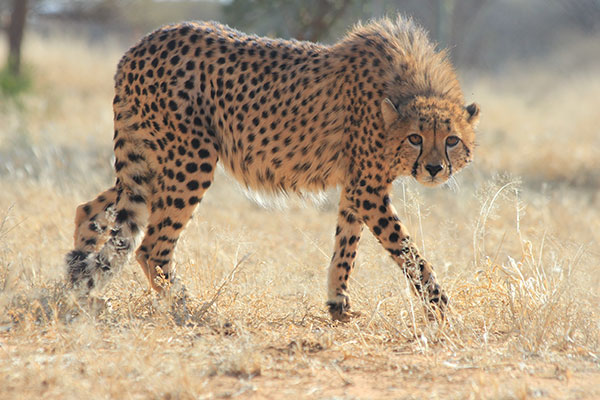
Mapenzi (male) is a cheetah and one of two cub siblings captured on a farm at approximately eight months old and brought to the Cheetah Conservation Fund (CCF) in December 2023. After a veterinary check in, it was decided that he and his sibling, Delilah, will remain at CCF until they can be released at two years of age.
Nandi
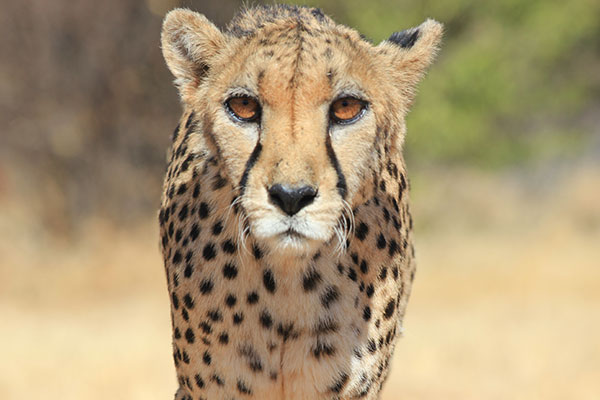
Nandi (female) was confiscated by the Ministry of Environment, Forestry, and Tourism (MEFT) from a lodge facility holding her without a permit and handed over to the Cheetah Conservation Fund (CCF) for continued care in August 2019. When she initially arrived, she was quite dehydrated. Despite receiving fluids and treatments, she stayed dehydrated, indicating a potential issue with her kidneys. Tests revealed very slight kidney failure, which is unusual for a cheetah of her age. She now receives fluids once or twice a week to stay hydrated, and her condition is being closely monitored.
Peter
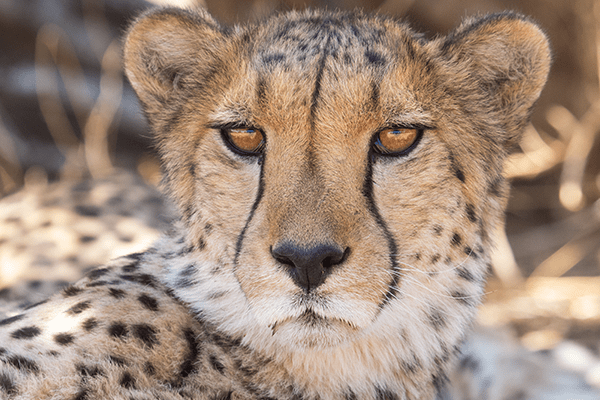
Peter (male) is one of the four Okakarara Cubs, which were brought to CCF when they were only a few weeks old in September 2010. Peter and his brother Khayjay and his sisters Senay and Tigerlily lived together and were being specially trained to be Ambassador Cheetahs. They served to teach visitors about the cheetah and its race against extinction. Peter works cooperatively with his handlers on his veterinary treatments and check-ups.
Rocket
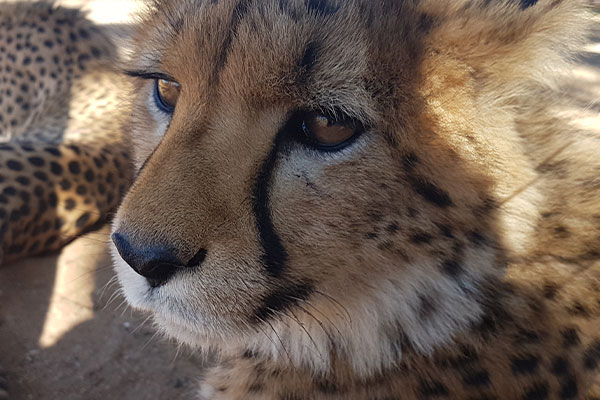
Rocket (HeChee) came to CCF at about 7 -8 weeks old in 2019. He was very small, tired and scared when he first arrived. The Ministry of Environment, Forestry and Tourism (MEFT) said that Rocket was caught by farmer after his dog was found chasing it. The farmer kept Rocket for a week and tried to get a permit to keep him but MEFT denied the request. Rocket was paired with Jaya who arrived shortly before he did. They became adoptive siblings and are very close now. The three can usually be found snuggling together in their enclosure.
Teja
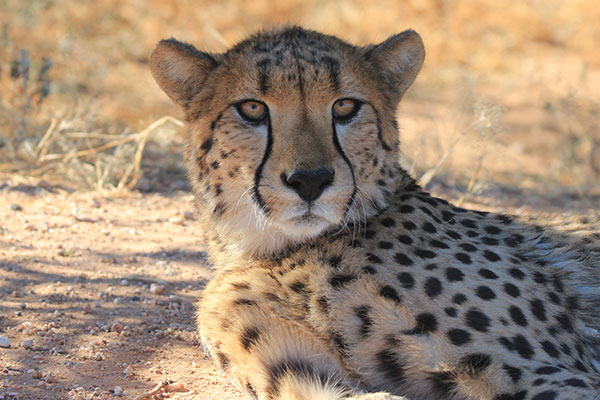
Teja (male) is a cheetah and one of three orphaned cubs (Hadassah – formerly named Shy, and Kora both females) born to a released female named Calypso. Calypso died from a snake bite shortly after giving birth, and the one-month-old cubs were rescued by CCF staff in March 2022. Teja was brought back to the main field center where he is being raised alongside her siblings and Kaveri.
Tigerlily
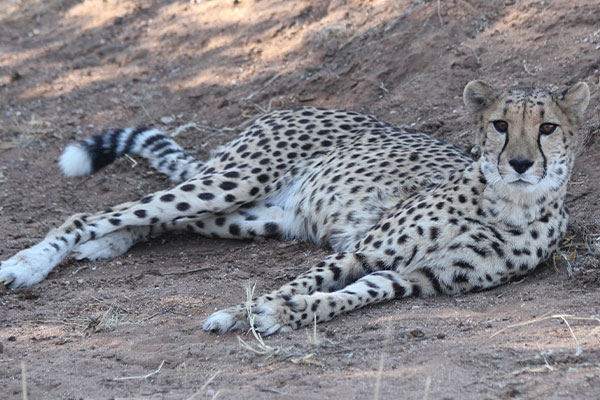
Tigerlily (female) is one of the four Okakarara Cubs, which were brought to CCF when they were only a few weeks old in September 2010. Senay and her brothers Khayjay and Peter, and her sister Senay lived together and were being specially trained to be Ambassador Cheetahs. They served to teach visitors about the cheetah and its race against extinction. Tigerlily works cooperatively with her handlers on her veterinary treatments and check-ups.
Tiny Tim
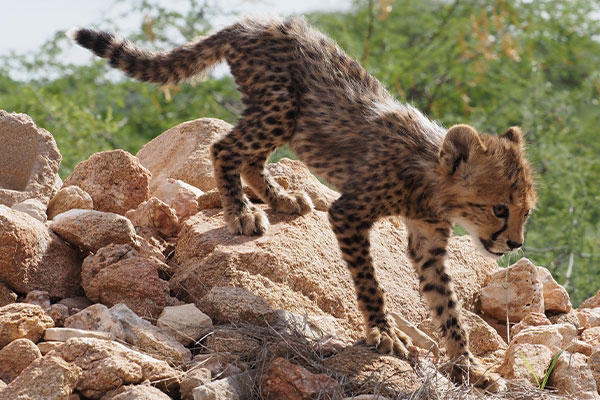
Somaliland – Tiny Tim is a juvenile male cheetah born in January 2025 and is the smallest in his cohort. His appearance is marked by a thinner, less fluffy tail with well-defined rings, including a secondary white ring near the end. His eyes are more hooded than his siblings’, giving him a distinctive, downturned expression often interpreted as sad. He has a narrow, pointed head and ears that appear slightly disheveled—frequently sticking out in various directions due to playful chewing by his siblings. His gait is noticeably pronounced, and he sits asymmetrically as a result of a missing femoral head in his left hind leg, a condition currently managed with a daily joint supplement.
Despite his physical challenges, Tiny Tim is full of spirit and energy. He is very playful, though often ends up at the bottom of the pile during roughhousing. He is rarely alone and prefers the company of his siblings, especially his sister Marline, with whom he shares a close bond. He has a strong sense of social awareness and adjusts his play accordingly, knowing when to be gentle or bold. Curious by nature, he is not afraid to explore on his own, even if it sometimes leads to difficult situations—like climbing up places he can’t quite get down from.
While he is generally cooperative during carcass feeds, he can be less inclined to share his bones. Due to his joint condition, enrichment activities are monitored closely to ensure they remain safe and accessible as he tires more quickly than his peers. Tiny Tim’s small size and physical limitations don’t diminish his presence—his resilience and lively temperament make him a standout member of the group.
T-Swift
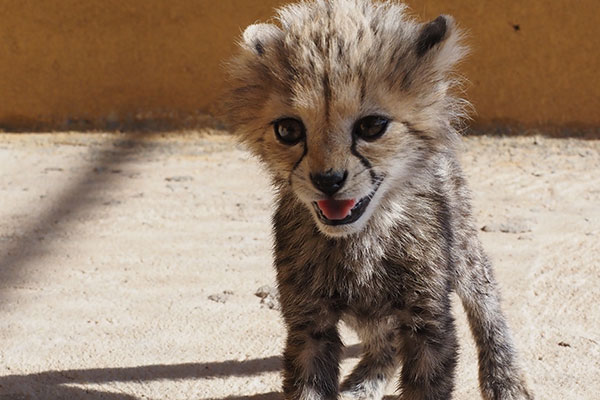
Somaliland – T-Swift is a juvenile female cheetah born in February 2025 and named for international superstar, musician and songwriter Taylor Swift. She is identifiable by her pale mantle and facial fur, almond-shaped upturned eyes, and a small black mark just to the right of her nose. Her tear lines are less defined than typical, giving her a softer facial appearance. T-Swift arrived with a very wild temperament and remains wary of humans.
She avoids close contact and will remove herself if staff are nearby. She remains highly self-protective and prefers minimal interaction, responding best when given space and quiet observation. Despite her defensiveness, T-Swift is socially engaged with her cohort and strongly bonded to her brother, often following his lead. She prefers to observe group play from the sidelines but takes part in group grooming sessions. T-Swift’s overall temperament is cautious and independent, and she continues to be monitored with minimal intervention to support her well-being and social development.
Zephyr
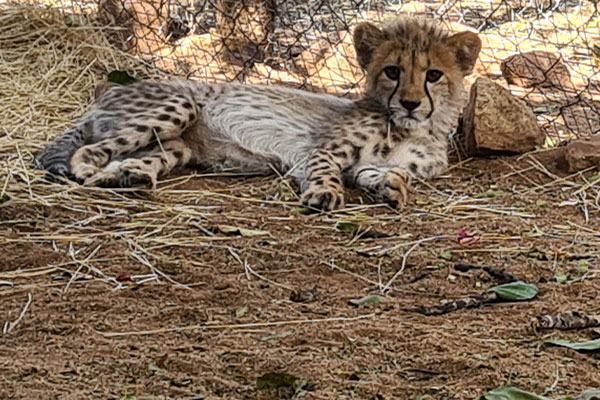
Zephyr (female) came to CCF in April 2024 after being found near Otjiwarongo, Namibia. She was one of three seven-week-old cheetah cubs found without their mother by local workers. Despite efforts to save all the cubs, who were weak, very thin, and dehydrated, one of the cubs died two days after arriving at CCF. Zephyr and her sibling Etango are recovering and healthy.